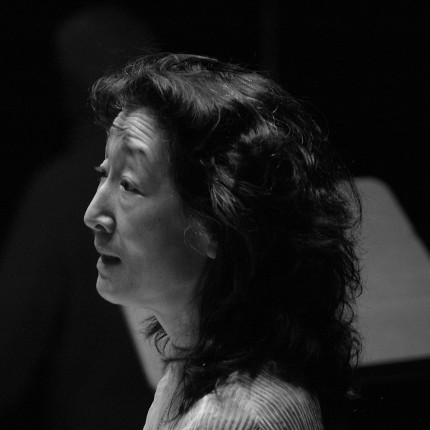Uchida and CSO team up for more memorable Mozart

As one of the world’s first fitfully successful composer-virtuosos, Mozart wrote the majority of his piano concertos for his own use as a performer.
For this year’s installment of her Mozart series with the Chicago Symphony Orchestra, presented Thursday night, Mitsuko Uchida elected to perform two concertos written by Mozart for others, both acclaimed women pianists.
Created for a Mlle. Jeunehomme—her first name remains lost to history—it was with the Piano Concerto No. 9 that Mozart brought the genre to a new level. The composer clearly was intent on upending established tradition from the outset. The soloist answers the orchestra’s opening statement immediately and impatiently jumps in a bar early with a trill rather than waiting for the exposition to finish. And in the exuberant brilliance of the closing Rondo, a stately waltz interrupts the keyboard fireworks, likely a private joke the origins of which we’ll never discover.
But it was with the Andantino that Mozart raised the concerto to a higher, deeper artistic form. Here in his first concerto slow movement in a minor key, the Andantino plumbs a vein of pessimistic introspection, even desolation, previously unknown in the light showy genre.
Uchida has built such a close bond with the CSO over recent seasons that one might think they are weekly rather than annual collaborators. Pure-toned, polished and vitally articulated, Uchida’s fleet take on the opening Allegro held the youthful energy and gracious lyricism in a dexterous balance. The pianist-conductor was at her considerable finest in the tragic depths of the Andantino, beautifully rendered with an elegant, expressive line, like an opera aria. The charm and brilliance of the Rondo was irresistible with the rollicking phrases batted back and forth between Uchida’s Steinway and the CSO winds and strings.
Like the Jeunehomme, Mozart’s Piano Concerto No. 18 was also composed for a celebrated musician of the day, in this case the blind Maria Theresia von Paradis. Mozart wrote six of his finest piano concertos in 1784 yet there’s not a hint of routine in this delightful work. The outer movements are typical of Mozart’s effervescent style, while, here too, the middle movement explores a darker, more personal expression.
The graceful orchestral introduction and seamless interplay between Uchida and the reduced CSO forces is truly the art that conceals art. Uchida’s poised line in the Andante brought out the somber introspection with a refined, luminous touch that felt just right. In some ways this was an even tighter and more unified performance than the Jeunehomme, with a wonderful verve and infectious spirit in the finale, the CSO musicians matching Uchida’s phrasing and accents, like chamber music writ large.
As is the tradition with Uchida’s Mozart programs, the concertos were prefaced by two works for strings sans conductor.
Stravinsky’s Concerto in D virtually personifies his Neo-Classical period. It was last played by the CSO in 1973, conducted by a young Daniel Barenboim. In the first movement a certain literal quality surfaced and the guiding hand of a conductor was missed. But, as led from the first desk by concertmaster Robert Chen, the CSO strings provided a polished reading alive to the spirit of Stravinsky’s astringent bustle with an especially stately charm in the central Arioso.
So too, Mozart’s Adagio and Fugue was a bit faceless though the stern indomitable quality of the fugue came across effectively.
The program will be repeated 8 p.m. Friday and Saturday and 3 p.m. Sunday. cso.org; 312-294-3000
Posted in Performances





Posted Apr 01, 2012 at 1:36 pm by Charles Moore
The latest research on Mlle. Jeunehomme from the Cambridge Mozart Encyclopedia identifies her as
Victoire Jenamy (b 1749;d 1812). French pianist, daughter of J. G. Noverre. “A first-rate pianist, Jenamy, the daughter of Mozart’s friend, the ballet master J. G. Noverre, commissioned from him the piano concerto K271 (January 1777). In their letters, Mozart and his father variously refer to her as ‘jenomy’ and ‘Madame genomai’; until recently she was supposed to be an unidentified French virtuosa, dubbed by the French scholars Theodore de Wyzewa and Georges de Saint-Foix ‘Jeunehomme’.”